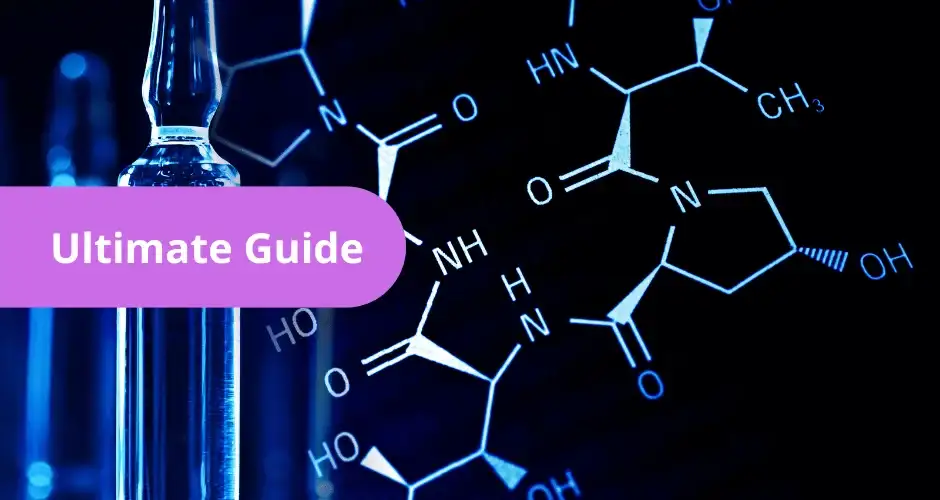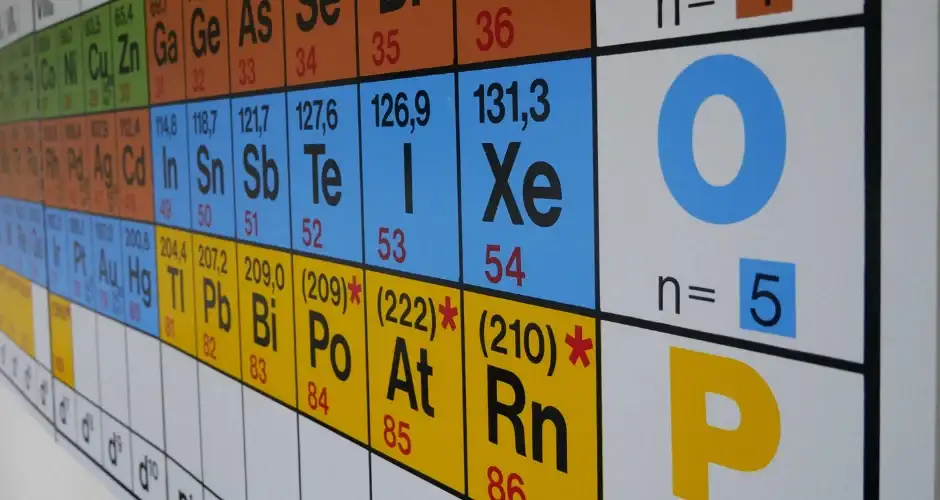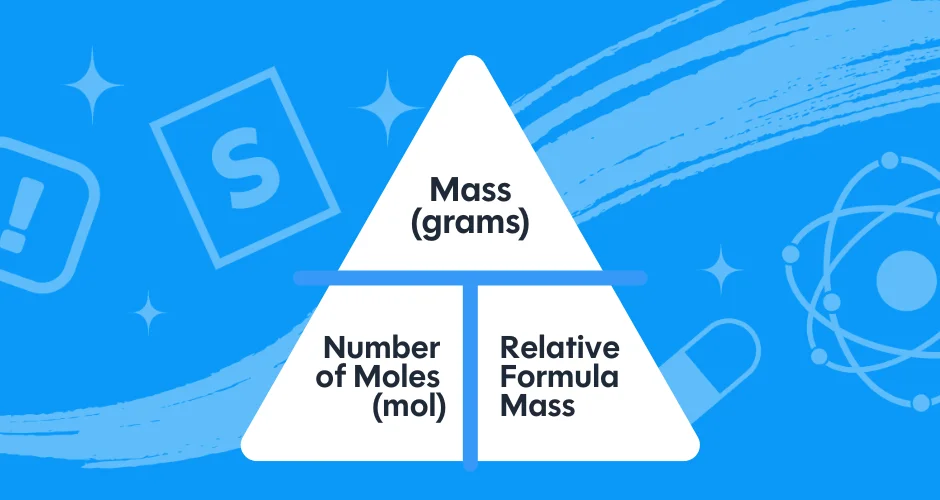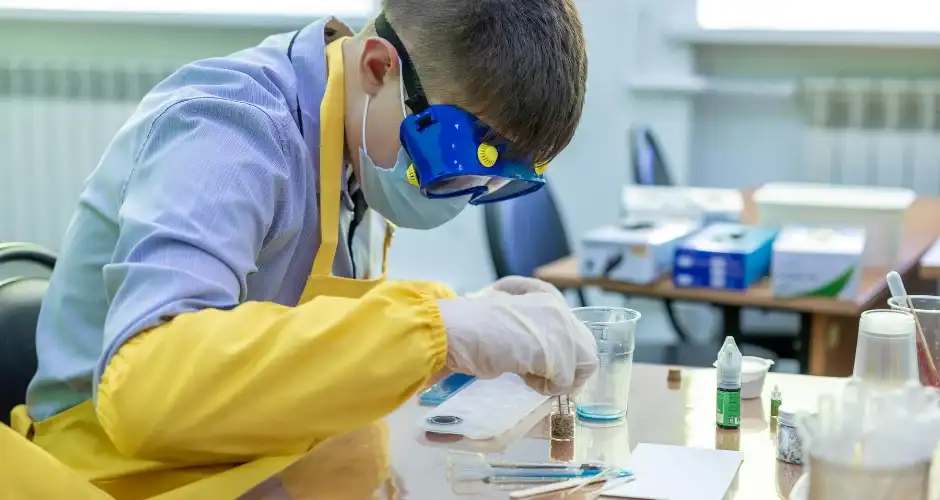GUEST POST
How to Get a Grade 9 in GCSE Chemistry

Chemistry as a subject is compulsory in schools in the UK at GCSE level, while Chemistry as a separate science is optional now you can choose to study Combined Science at GCSE.
As a subject, there are mixed opinions regarding Chemistry, but it is usually agreed that it can be difficult to achieve a Grade 8 or 9 due to the level of application and critical thinking required beyond just memorising the content.
Additionally, the course becoming linear from 2015 has further made it more challenging as the students sit the exam all the way at the end of Year 11. But getting a Grade 9 is possible through some simple tricks and techniques discussed in this article.
Understanding the Specification
Irrespective of the exam board, the layout of the specification and the sequence of topics are fairly similar. It starts off with the basics of atoms and compounds, which is essentially a revision of Key Stage 3 content.
This provides the building blocks for topics such as chemical changes and energy changes, after which organic Chemistry is explored, but quite superficially, as it's a vast and complex topic majority of which is taught at A-Level.
Understanding the Nature of the Subject
Chemistry as a subject relies on prior knowledge of simple concepts such as atoms, chemical formulae and quantitative aspects to build upon complex topics.
Due to this, it will be nearly impossible to understand the latter topics if your foundation is weak. For example, you cannot deduce the chemical formula of calcium chloride without knowing the electron configuration of the individual atoms and how they bond.
This is why teachers revisit the initial concepts throughout the GCSE journey, and the best way for you to do so is to work on exam questions and turn it into a habit. This also ensures that you do not forget the earlier knowledge.
Below are two examples of questions from an AQA paper which will require you to draw upon knowledge from a prior topic.
- What is the percentage by mass of copper in copper(II)-oxide?
This question appears in a Topic 10 paper but requires knowledge of relative atomic masses from quantitative chemistry, which is Topic 3 in the specification.
- Air is 20% oxygen. Calculate the volume of air needed to provide enough oxygen to react with 3.50 dm3 of hydrogen gas. (Single Science only).The equation for the reaction is 2H2 + O2 → 2H2O
The question above is from Topic 9, but again requires Topic 3 knowledge.

Mathematical Skills are Key
Chemistry is known to have one of the strongest cross-curricular links with Mathematics - so being can Combined science papers have almost 20% of their questions of some mathematical nature. This is also true for Chemistry as a separate science.
This becomes apparent when we see that there is an entire topic which deals with mathematical calculations called “Quantitative Chemistry”. This topic, along with other topics, consists of mathematical formulae and considered the easiest one to drop marks on. Some examples include:
- Moles = mass / RAM (Relative Atomic Mass)
- Moles = concentration × volume
- Moles = 24 x volume in dm3 (Triple Science students only)
- Rate = concentration/time
There is no doubt a lot to memorise. However, most equations in GCSE Chemistry can be turned into formula triangles, which makes it easier not only to remember them but also to find other quantities within that equation.
Equation Triangles
Simply scribble the relevant triangle onto your exam paper to find out how to find the missing quantity by hiding it with your finger.
For example, to find the mass of a substance given its moles and relative formula mass, you have to simply multiply them if you cover the “mass” quantity on the triangle as shown below.

The rule is that if the two quantities are above and below, you divide the above quantity by the below quantity. If the quantities are next to each other, you multiply them.
In addition to learning new equations, it is a good idea to brush up on some basic mathematical concepts such as:
- Find the gradient of straight lines
- Calculate the rate of a reaction
- Plotting graphs
- Writing numbers to appropriate significant figures (usually 3 s.f.)
- Using basic addition and multiplication to balance chemical equations
- Calculating percentage changes
- Making basic conversions such as from cm3 to dm3
Please note that this list is not exhaustive; it just covers some of the mathematical concepts involved in the subject that are key to picking up ‘easy’ marks. If you are aiming for a grade 9 in Chemistry and you struggle with this sort of Maths I highly recommend seeking a GCSE Maths online tutor to help boost your confidence.
Once again, the best way to master questions involving calculations is to practice many exam-style questions, particularly those which are worth 3 marks or more, as those involve multiple steps and problem-solving, which we shall discuss in more detail later in this article.
Experimental Skills Matter
In addition to the theory, there are a number of required practicals spanning both the combined and triple science specifications. Being a very hands-on subject, there are a significant number of marks attributed to practical skills.
While you won’t be examined on how you carry out these practicals, the skills that you use can easily be tested on paper in different contexts. For example, you might be required to draw a graph of concentration against time to find out the rate of a reaction in a required practical, but the skill of drawing, plotting and interpreting a graph can easily be tested for a completely different, made-up practical in the exam.
Some other relevant skills that one must be prepared to put on paper include drawing up a hypothesis, drawing tables in a scientific manner, reading measurements correctly and evaluating either a given method or your own. Some very generic points which will almost always guarantee marks when it comes to evaluation and improvement include:
- Mentioning repeats of experiments and deriving averages
- Controlling certain variables
- The mention of a control setup
In addition to applying experimental skills, students are also tested on the method of a required practical that they have carried out in class. Therefore, it is a must to roughly remember the method of an experiment, the various variables and how to collect and interpret the results.
Usually, these types of questions are worth either 5 or 6 marks. An example of such a question is given below:
Q. Describe a method to work out the products of electrolysis of a sodium chloride solution. In your answer, describe how to obtain valid results (6 marks).

Tackling the Hardest Questions
The difference between getting a 9 and a 7 or an 8 often lies in answering questions worth more marks correctly, without any mistakes, as the grade boundaries are sometimes painfully slim.
6 Marker Questions
As discussed earlier, in a subject like Chemistry, questions worth 6 marks are often related to do with experimental methods or techniques. Although students may get most of the scientific points correct, their answers are often in poor English and not laid out in a very logical order. This is where they lose the fifth or sixth mark.
Whenever you approach a 6-marker question, imagine you are writing a story. To plan it, one may jot down some quick points. But the final story would have a logical flow to it, which may also be in chronological order. The same applies to a 6-marker question; the language and grammar matter.
In a nutshell, draft your practice answers and get someone else, like your GCSE Chemistry Tutor to read it. If it makes sense to them and they can follow what you have written, you are good to go. If that individual has some background in Chemistry, even better!
Multi-Step Math Questions
The second category of difficult questions is the multi-step maths questions, often worth 3 or 4 marks. This usually crops up in triple science papers, but if you are unlucky, double science student might come across one of these too.
An example of such a question could require you to find the mass or volume of a product of a reaction, where they have provided a chemical equation and the masses of other reactants, or they may provide initial and final mass readings from a weighing scale.
The beauty of such questions is that they don't penalise you for writing the wrong numbers throughout your working; they just do not grant the final mark for the correct final answer provided the formulae and method are correct. This is called error carried forward (ECF).
Therefore, even if you do write the wrong number (we are human and not perfect!), make sure you double-check that the method of working it out is correct and you will only drop 1 mark.
Always Check Your Answers
This advice is pretty generic and applies to any subject. It may seem like a repetitive instruction from teachers, but you'd be surprised how many small changes students tend to make when they check their answers after completing the paper with some time left.
We often tend to overlook certain things which give us those precious marks that can change our final grade. This includes numbers in math questions (as we just discussed), spelling mistakes, chemical formulae, units etc.
Sometimes, we are under pressure as well to finish the paper quickly, thereby increasing the chances of these common errors. It is therefore essential to allocate some time after completing the paper to check the answers.
A good 10-15 minutes is enough most of the time. You do not want to be finishing off the paper right on time, as this can make you fall under the pressure of the ticking clock and therefore make silly mistakes.
This is especially important as the more challenging questions, including 6-marker questions, fall towards the end of the paper, generally speaking.
Rushing through those questions means you lose many precious marks, and your grade potentially falls even if the rest of the answers are on par with Grade 9 understanding.
Another way to combat this is to start the paper backwards, as the first portion is often multiple choice, which is relatively easier to work on under time constraints.
This is worth practicing with past papers under the same time pressure as you revise so you can be confident which strategy works best for you to maximise your marks!
Final Thoughts
If Grade 9 is your aim, you must work towards that from the beginning of your GCSE journey in Year 9 or 10. You will need a sound understanding of the topics you cover as you progress, rather than start to properly learn things a month before the exam, expecting a Grade 9.
Always communicate with your GCSE Chemistry tutor or teacher to keep track of your predicted grade, and when the exam day arrives, walk in with a cool mind! People wind down their nerves in many different ways, so do what works best for you. All the very best!
Parents
Students

Fatema A
Tutor
Experienced Science and Maths teacher covering Key Stages 1-5 and SEN!
Looking for a tutor?
Sherpa has hundreds of qualified and experienced UK tutors who are ready to help you achieve your goals. Search through our tutors and arrange a free 20 minute introduction through our industry-leading online classroom.
Find a TutorSimilar Articles



